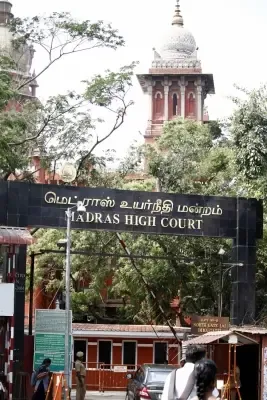Why Did the Madras HC Suspend the Contempt Sentence for IAS Officer Anshul Mishra?

Synopsis
Key Takeaways
- Suspension of contempt sentence for Anshul Mishra.
- Legal disputes over land can take decades.
- Public accountability is crucial for trust in governance.
- Judicial decisions can influence public service conduct.
- Timely action by authorities is essential to uphold justice.
Chennai, June 12 (NationPress) A Division Bench of the Madras High Court has suspended the one-month sentence of simple imprisonment imposed on senior IAS officer Anshul Mishra related to a contempt case. This suspension comes after Mishra was sentenced for not adhering to a court order in a protracted land reconveyance matter.
The bench, featuring Justices M.S. Ramesh and V. Lakshminarayanan, issued interim orders while deliberating on an appeal submitted by Mishra against his conviction and sentence.
The court instructed Mishra to deposit Rs 25,000 with the Registrar (Judicial) of the High Court within a three-week period, emphasizing that this direction does not affect his otherwise unblemished service record.
The hearing for the appeal has been rescheduled for July 21. The contempt proceedings emerged from a petition by two elderly siblings, R. Lalithambal and K.S. Viswanathan, who have struggled for decades to reclaim their ancestral property in Chennai.
The disagreement traces back to 1983, when the Tamil Nadu Housing Board (TNHB) acquired 17 cents of their land along Nesapakkam Road for the construction of tenements.
However, the land remained untouched for a prolonged period. The petitioners initiated legal measures to seek the reconveyance of the unused portion.
Eventually, the government returned 10.5 cents but held onto the remaining 6.5 cents, citing plans for road expansion, leading the siblings into further legal battles.
On November 22, 2023, Justice P. Velmurugan had instructed Anshul Mishra, then the Member Secretary of the Chennai Metropolitan Development Authority (CMDA), to evaluate the petitioners' request and issue suitable orders within two months.
However, due to inaction, the siblings filed a contempt petition. The CMDA only complied with the court order after the contempt petition was submitted, but Justice Velmurugan expressed his discontent over the nearly two-year delay.
"This court expresses concern that such behavior by public officials is not an isolated event," the judge remarked while imposing the one-month sentence for contempt.
In his ruling, the judge allowed Mishra a one-month period to appeal, resulting in the Division Bench's suspension of the sentence on Thursday.










